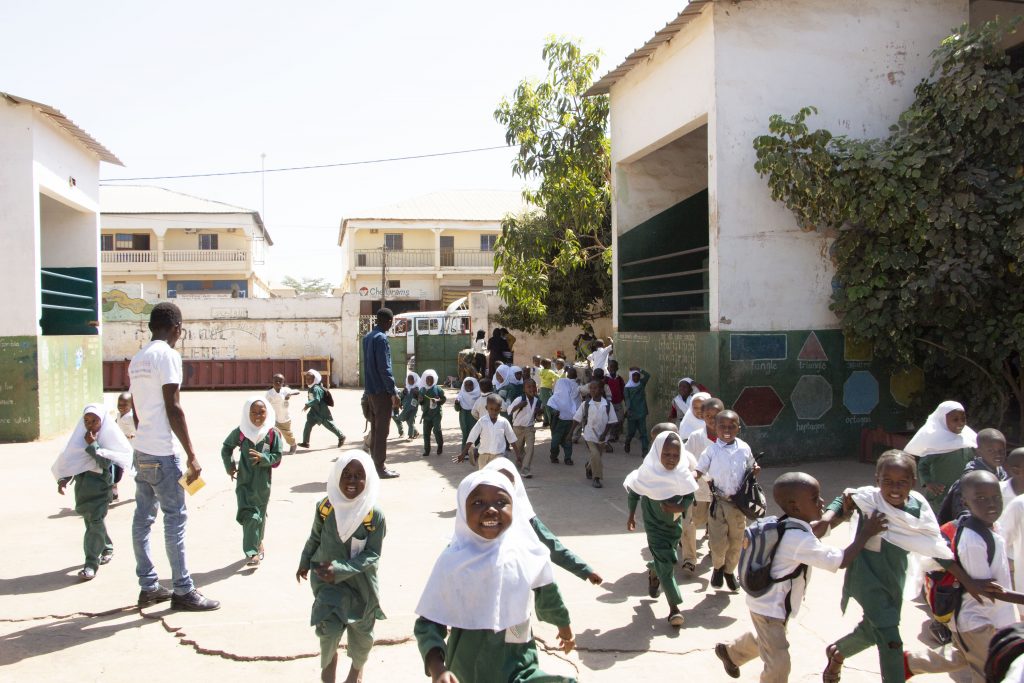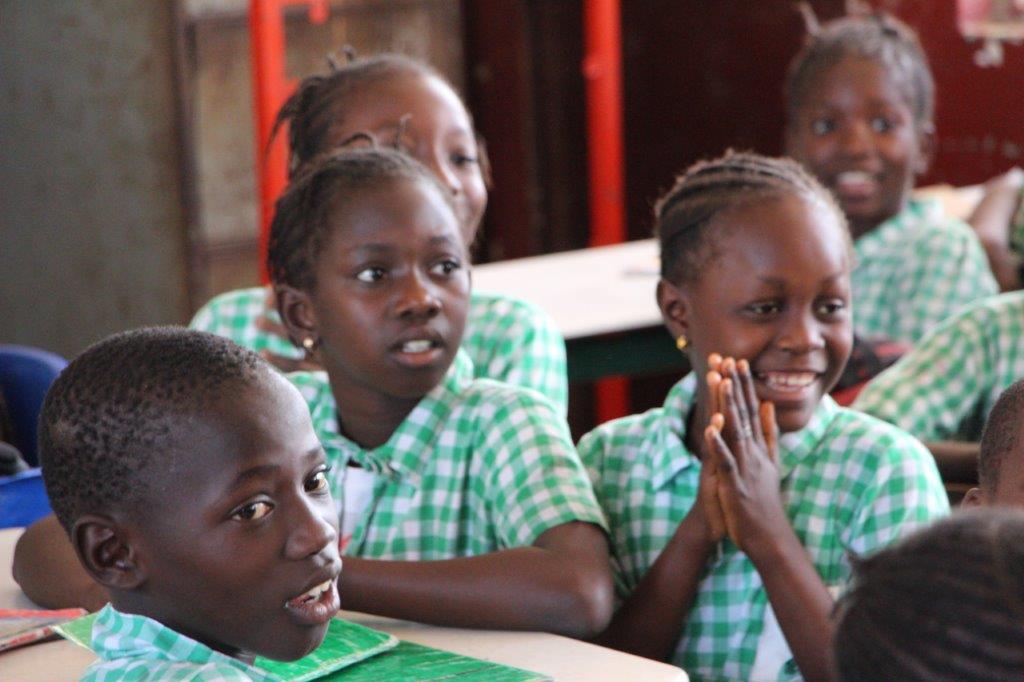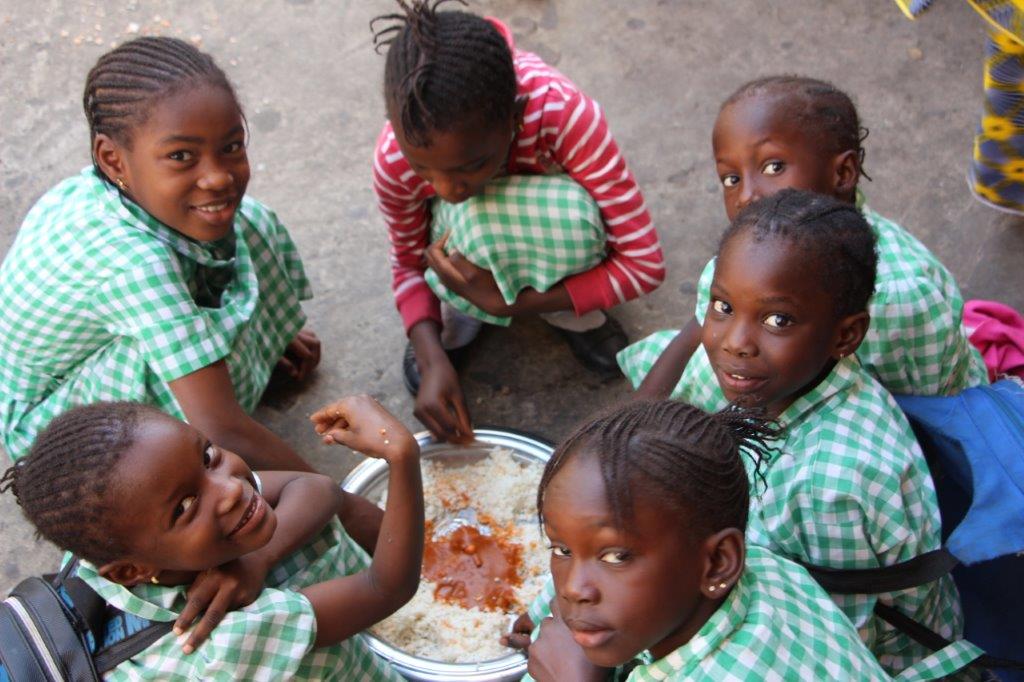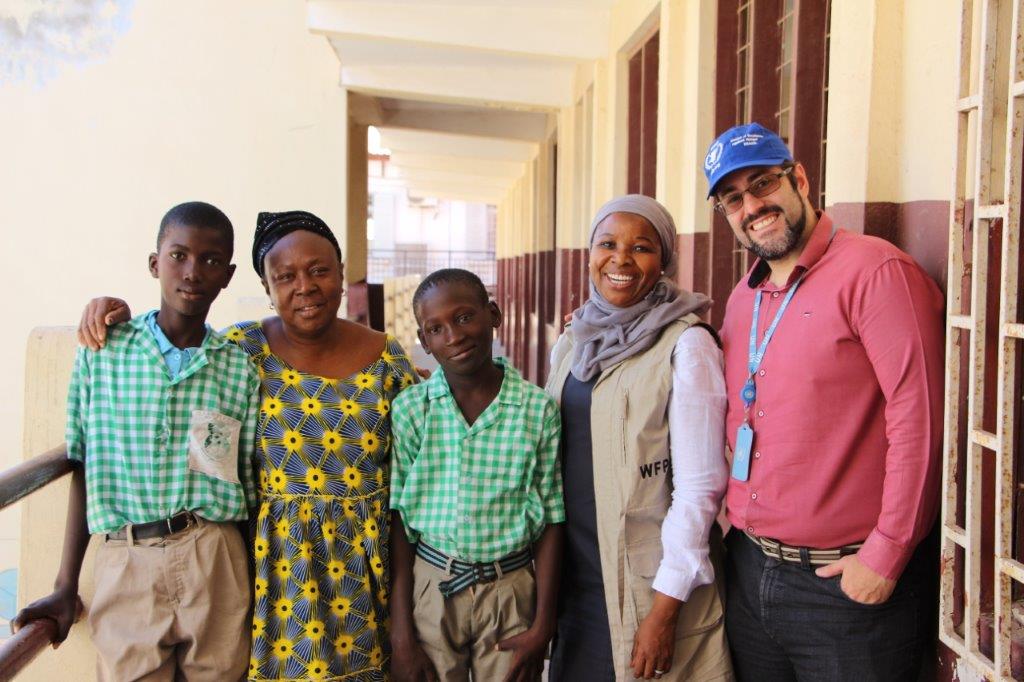Learn more about the work the WFP Centre of Excellence does on the field in this report by Programme Officers Igor Carneiro and Bruno Magalhães

Kindergartens leave their classrooms to eat their school lunch at the Muhammadan Lower Basic School’s patio. Photo: WFP/Kebba Jallow
The WFP Centre of Excellence against Hunger has visited The Gambia for a two-week mission to help the country in the next phase of the national home-grown school feeding (HGSF) programme. Igor Carneiro and Bruno Magalhães, Programme Officers at the Centre of Excellence, are supporting the Country Office on the transition and scaling-up process under the leadership of Ms. Wanja Kaaria, Country Director and Representative. This joint-effort of the WFP offices in both Brazil and The Gambia has the potential to reach up to 160,000 vulnerable Gambian citizens, most of which are children of up to 12 years-old in three regions of the country: Wester Division, Lower River and Central River. Most of the potential beneficiaries are school-aged girls and rural women, reaching up to 85,000 people.
Since March 2018, the Centre of Excellence, the WFP Country Office and the Government of The Gambia have been fostering the reinforcement of a HGSF Multisector Working Group. This group seeks to scale-up the connection of the exiting models for school feeding programme in the country with the agriculture sector. For that, the Centre of Excellence and the WFP Country Office are preparing several resource mobilization projects for international funds to finance actions on country capacity stregnthening and smallholder farming development through South-South cooperation with gender-sensitive approaches.

4th graders, aged 11-12 years-old, at the Albion Lower Basic School, a public school in Central Banjul, learn Arabic during the WFP Brazil visit for needs assessment. WFP/Kebba Jallow
Joint effort
On the institutional and high-level environment dimensions of this process, the WFP Country Office, WFP Brazil along with the ministries of Agriculture (MoA), Basic and Secondary Education (MoBSE), and Women, Children and Social Welfare share the leadership of this key HGSF intervention. The joint efforts of the three ministries are expected to consolidate the appropriate coordination for programme delivery and policy coherence of the transition planning.
In particular, the Ministry of Agriculture (MoA) is intended to support the coordination of all aspects of strategic planning for organizing production and to engage and capacitate smallholder farmers and their associations, so they become able to supply the school feeding market. The Ministry of Basic and Secondary Education (MoBSE) plays the role of managing the environment and the organizational domains for existing school feeding programme policy tools. The plan is to find appropriate strategies and stakeholder support to scale-up the national school feeding programme, taking ownership from WFP.
The WFP Country Office in The Gambia has the prime responsibility to coordinate all technical support with the local government, from actor mobilization to programme implementation. The Country Office, led by Wanja Kaaria, acts as the entry point to connect WFP Brazil with the Government and local actors. Through South-South and Triangular Cooperation, the WFP Centre of Excelelnce provides capacity strengthening knowledge, advocacy and technical advisory services.
Visit to schools as part of the needs assessment stage
As part of the third visit to finalize some of the project preparations, the Centre of Excellence, WFP Country Office and the Ministry of Basic and Secondary Education (MoBSE ) visited two schools in central Banjul, the capital of The Gambia, to learn more on the best practices and on the capacity needs for project developments. The Centre of Excellence’s support for resource mobilization has the potential to catalyse over USD 10 million for the Government of The Gambia to continue taking ownership of the WFP Country Office work on scaling-up the school feeding programme in the country. Jerreh Sanyang, the Deputy-Permanent Secretary of the MoBSE, organized the visits for WFP at the Albion Lower Basic School and at the Muhammadan Lower Basic School. Landing Sonko, the national school feeding focal point, led the visits.

1st grade schoolgirls, aged 7 to 8 years-old, share a large school lunch dish locally named “Domoda”, consisting of rice and groundnut sauce during their turn at Albion’s central patio.
Albion is an elementary and middle public Methodist school, educating children from 7 to 12 years-old. The 831 boys and girls who study at Albion get hot meals every day. Elizabeth Chapman, the headteacher of the institution, and Aye Gomez, deputy-headteacher, explained the role of the WFP Country Office to make the school feeding a reality and how the meals are prepared. “Empty stomachs can’t learn and can’t stay at school. These children come to Albion because they and their families know that school meals will make their attendance and retention possible”, highlighted Elizabeth Chapman.

Elizabeth Chapman explains to Bruno Magalhaes the history of school feeding at Albion school and the positive impacts she sees in her students’ development. Over the shelf, some of the trophies the school has conquered over the years with their well-nourished children. Photo WFP/Kebba Jallow
At Albion, children eat school meals in different shifts every day, as the school is still in need of a cafeteria with enough tables and seats. Elizabeth Chapman reports that the WFP procures one part of the food with money decentralized from the Government. The school procures the other part of the food basket from local markets, mostly issued from smallholders’ production. The school saves money from other sources to buy utensils for their kitchen.
Aye Gomez, the deputy-headperson at Albion, joined by some 4th graders, guided the Centre of Excelelnce’s officers and the Country Office’s Programme Advisor, Lillian Mokgosi, through a visit to the school. Aye Gomez described the importance the school has for the local community and how the staff is committed to enhancing school attendance and retention with daily hot meals. Gomez presented the story of Assan Njie, a young 13-year-old Gambian boy, whose mother remained in Senegal while he came back to Banjul to join his father, who is a Gambian national. Aye Gomez talked about Assan’s background and of her efforts to bring him back to school after he came back to Banjul. “If it wasn’t for school feeding, Assan would have not attended this school again”, said Gomez.

Young 4th graders Alagie Jallow, 12 years-old, and Assan Njie, 13 years-old, joined Aye Gomez to show their school for Lillian Mokgosi and Igor Carneiro. Photo: WFP/Kebba Jallow
After the visit to the Albion School, the WFP and MoBSE teams went to the Muhammadan Lower Basic School, a public Koranic school also in Central Banjul. This school educates 750 boys and girls up to 7 years-old. Muhammadan Lower School was part of the pilot phase of the home-grown school feeding programme in the country in the early-2000s. WFP Brazil was at Muhammadan Lower School in April 2018 and came back to meet the headteachers of the institution and learn more on the programme delivery for the youngest children.
Yafatou Mbai Samba, the Head Mistress of the institution, and Rohey Jobe Sillah, the Deputy Head Mistress and the chief of the school cooks, presented to WFP how the programme is being implemented at their school. “Food is basic to life. Every child deserves to be fed properly and come to school”, said Yafatou Samba. She added that “the national ownership of a school feeding programme is very important for delivering school meals at all schools”. Rohey Jobe Sillah explained that parents can contribute with GMD 5.00 monthly (USD 0.10) to improve the conditions of the school meals’ delivery, as all public money transfer must be allocated to food purchase. “All students will eat at our school, even those that cannot contribute with money”, guaranteed Rohey Jobe Sillah.

Ms. Yafatou Mbai Samba, the HeadMistress of the Muhammadan Lower Basic School, a public Koranic school also in Central Banjul. Photo: WFP/Kebba Jallow
Another important factor discussed during the visit was the increasing number of children living in the streets in Central Banjul. “They will knock on our school doors asking for food. We always try to feed them with any remaining food from the cooked school meals. Even though they cannot benefit from the school feeding programme, because they do not attend school, we make all efforts to keep them fed”, highlighted Yafatou Samba. This is an important issue gaining attention in the national food and nutrition security scenario as it affects the most vulnerable children in the country.
Follow us on social media and visit our website for updates as our work at The Gambia continues.
Want to support our work? Donate here >>





